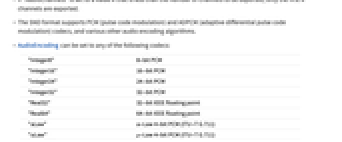SND (.snd)
Background & Context

-
- Registered MIME type: audio/basic
- SND audio format.
- Used for digital audio in computer and telecommunication systems and on the web.
- Supports a variety of audio codecs, including lossless uncompressed PCM, μ-law, a-law, and ADPCM voice compression.
- Sometimes referred to as μ-law format or Unix Audio Format.
- The μ-law algorithm is a standard method for compressing the dynamic range of a signal.
- SND is an acronym derived from Sound.
- Binary file format.
- Supports various sampling frequencies and an arbitrary number of channels.
- Identical to the AU format.
- Developed by Sun Microsystems in 1992.
Import & Export

- Import["file.snd"] imports an SND file, returning an audio object.
- Import["file.snd",elem] imports the specified element from an SND file.
- The import format can be specified with Import["file","SND"] or Import["file",{"SND",elem,…}].
- Export["file.snd",expr] exports an audio or sound object to an SND file.
- Sound objects including notes are rasterized to sampled audio.
- See the following reference pages for full general information:
-
Import, Export import from or export to a file CloudImport, CloudExport import from or export to a cloud object ImportString, ExportString import from or export to a string ImportByteArray, ExportByteArray import from or export to a byte array
Import Elements

- General Import elements:
-
"Elements" list of elements and options available in this file "Summary" summary of the file "Rules" list of rules for all available elements - Data representation elements:
-
"Audio" audio signal given as an Audio object "AudioFile" audio signal given as an out-of-core Audio object "Data" raw audio samples, given as a list of real numbers, each sublist representing an individual audio channel "SampledSoundList" audio signal given as a SampledSoundList object "Sound" audio signal given as a Sound object - Import and Export use the "Audio" element by default for SND files.
- Advanced Import element:
-
"Duration" duration of the audio given in seconds "Length" number of samples "MetaInformation" metadata "SampleDepth" number of bits used to store every sample "SampleRate" number of amplitude samples per second and channel
Options


- Import and Export option:
-
IncludeMetaInformation All whether to include meta-information SampleRate Automatic number of samples per second for each channel - Detailed properties and settings:
-
"AudioChannels" Automatic the number of audio channels in the file AudioEncoding "Integer16" how samples are encoded - If the sample rate is not specified when exporting to SND, the highest sample rate occurring in the exported sound is used, and all sounds are resampled as necessary.
- If the number of channels is unspecified, the highest number of simultaneous channels is taken, and silence is inserted if necessary.
- If "AudioChannels" is set to a value n that is less than the number of channels to be exported, only the first n channels are exported.
- The SND format supports PCM (pulse code modulation) and ADPCM (adaptive differential pulse code modulation) codecs, and various other audio encoding algorithms.
- AudioEncoding can be set to any of the following codecs:
-
"Integer8" 8-bit PCM "Integer16" 16-bit PCM "Integer24" 24-bit PCM "Integer32" 32-bit PCM "Real32" 32-bit IEEE floating point "Real64" 64-bit IEEE floating point "aLaw" a-Law 4-bit PCM (ITU-T G.711) "uLaw" μ-Law 4-bit PCM (ITU-T G.711) "G721-32" 32 kbps ADPCM (ITU G.721) "G723-24" G.723 encoding at 24 kbps "G723-40" G.723 encoding at 40 kbps - Not all codecs support arbitrary sample rates and channel specifications.
Examples
Basic Examples (1)
Use Play to create a sound sample: